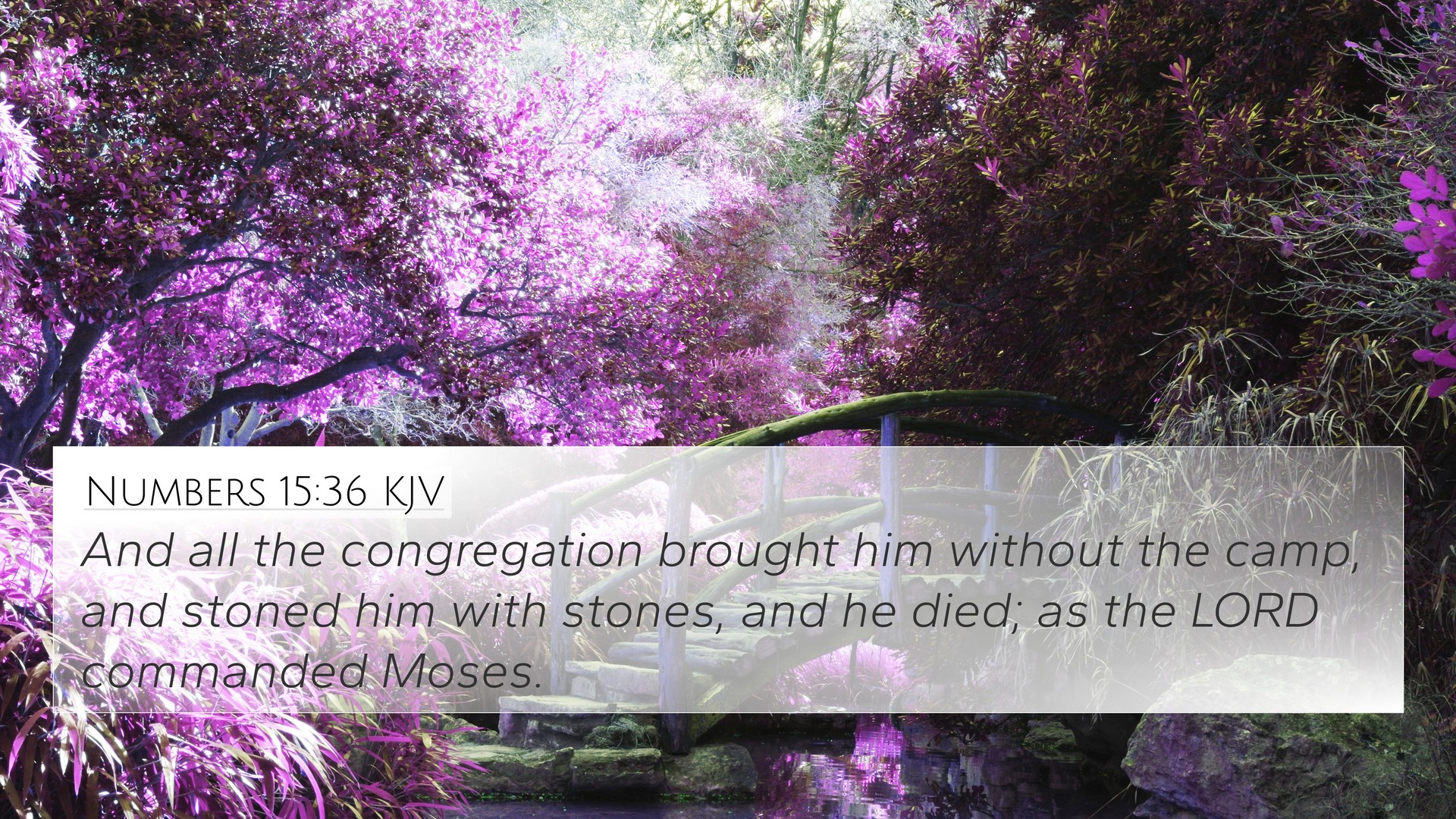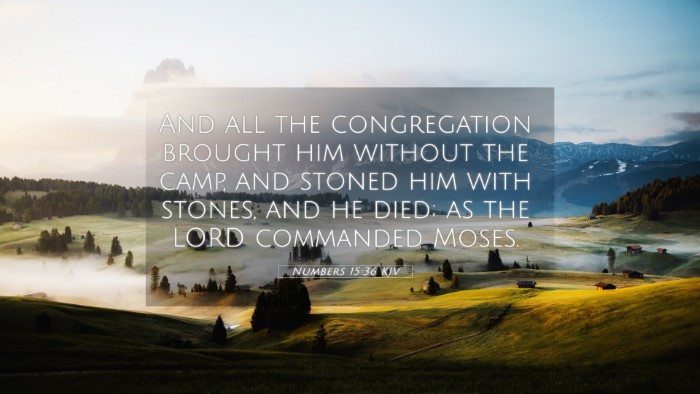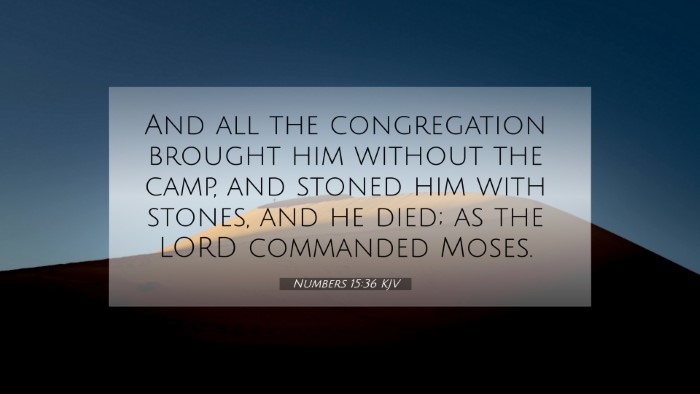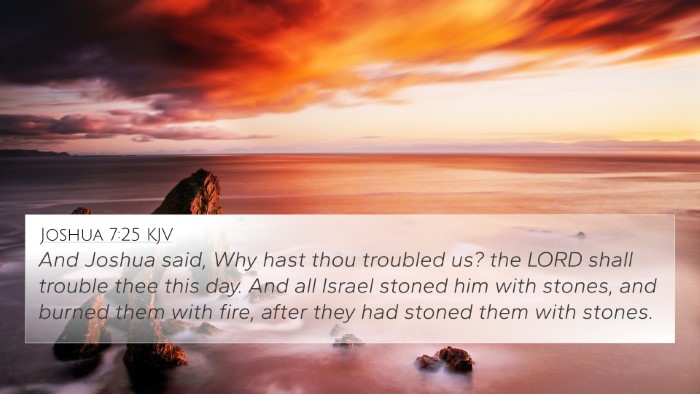Understanding Numbers 15:36
Numbers 15:36 states: "And all the congregation brought him without the camp, and stoned him with stones, and he died; as the LORD commanded Moses." This verse highlights a significant event in the life of the Israelites during their journey through the wilderness, particularly emphasizing the importance of obedience to God's commandments.
Summary of the Verse
The context of Numbers 15 involves the Lord communicating laws to the Israelites about offerings, sacrifices, and penalties for disobedience. The specific incident in verse 36 describes the punishment of a man who violated the Sabbath by gathering sticks on that day. This act of disobedience reflects the seriousness with which God views the sanctity of the Sabbath.
Commentary Insights
- Matthew Henry: Henry emphasizes that this punishment serves as a warning of the consequences of disregarding God's commands. The act of gathering sticks, though seemingly trivial, was a direct violation of a divine order meant to set apart the Sabbath for rest and worship.
- Albert Barnes: Barnes highlights that the assembly's action was a matter of communal responsibility. The whole congregation was involved in the judgment, signifying the severity of transgressing God's law. This illustrates the collective nature of Israel's identity as a holy people.
- Adam Clarke: Clarke notes the historical context and love for God's law among His people, asserting that the stoning was carried out to maintain the authority of God's commands. The punishment was not solely about the man's actions but about upholding God's holiness within the community.
Significance of Stoning in Biblical Context
The act of stoning was a traditional method of execution in Ancient Israel, usually reserved for serious offenses such as idolatry, blasphemy, or flagsrant disregard of covenant laws. This reflects the gravity with which the Israelites were to regard God's commandments.
Cross-References
Many passages throughout the Bible resonate with the themes presented in Numbers 15:36. Below are some significant cross-references that deepen the understanding of this verse:
- Exodus 31:14: "You shall keep the Sabbath, therefore, for it is holy to you; everyone who profanes it shall surely be put to death."
- Leviticus 20:2: "Say to the people of Israel, Any one of the people of Israel or of the strangers who sojourn in Israel who gives any of his children to Molech shall surely be put to death."
- Deuteronomy 13:6-9: Discusses the manner of punishment for those who lead others away from God, illustrating the seriousness of sin among God's people.
- Matthew 12:8: Jesus declares, "For the Son of Man is Lord of the Sabbath," emphasizing authority over Sabbath observance.
- Hebrews 10:26-27: Warns about the severe consequences of willfully sinning after receiving the knowledge of the truth, resonating with the fate of the Sabbath violator.
- 1 Corinthians 5:13: Paul discusses the need for church discipline, instructing to remove the wicked person from among them, paralleling the communal execution of God's law.
- Revelation 22:18-19: Emphasizes the importance of adhering to God’s commands and the dire consequences of adding to or taking away from His words.
Theological Implications
The events surrounding Numbers 15:36 serve as a sobering reminder of God’s holiness and the seriousness of sin. They underscore the importance of obedience and the communal nature of maintaining holiness within a faith community. Through this narrative, believers today are called to reflect on their own lives, assessing the weight of obedience to God's commands.
Conclusion
Understanding Numbers 15:36 requires examining the broader historical, cultural, and theological context of the verse. The harsh judgment imposed in this instance serves not merely as a historical record but as a profound teaching on the balance between grace and obedience, underscoring the concept of community accountability in adhering to God’s will.
Further Study Tools
For those looking to deepen their understanding of biblical texts and cross-references, the following resources may be helpful:
- Bible Concordance: A comprehensive index that helps in locating specific verses and understanding their connections.
- Bible Cross-reference Guide: A tool designed to discover related verses and themes throughout Scripture.
- Cross-reference Bible study: Methods to analyze and study connections between verses across both Old and New Testaments.
- Bible reference resources: Books and online tools that provide insightful connections between different biblical passages.
Engagement with Scripture
As we study scripture, recognizing the connections between Bible verses adds depth to our faith journey. Engaging with these texts and their inter-Biblical dialogues fosters a more comprehensive understanding of God's word and allows believers to live in accordance with His will.



